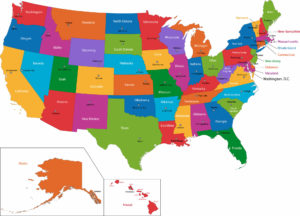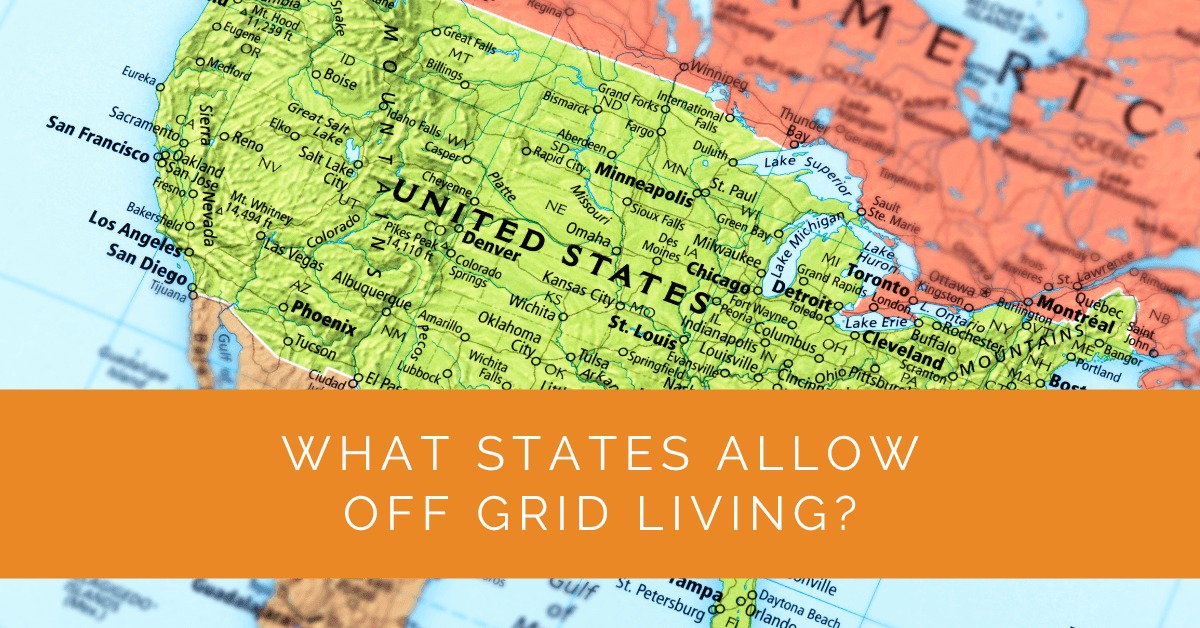In the hustle and bustle of modern life, the idea of off-grid living—disconnecting from public utilities and living a self-sufficient lifestyle—has become increasingly appealing. But where is the best state to live off the grid? And what factors should you consider if you want to go off-grid? This comprehensive guide will help you navigate the complexities of off-grid living across the 50 states.
Contents
- 1 Key Takeaways
- 2 Understanding Off-Grid Living
- 3 Key Factors to Consider for Off-Grid Living
- 3.1 Land Prices: The Cost of Living Off the Grid
- 3.2 Local Laws and Regulations: Navigating Off-Grid Laws in Different States
- 3.3 Weather and Climate: The Role of Climate in Off-Grid Living
- 3.4 Local Building Codes: Building Your Off-Grid Home
- 3.5 Property Taxes: Financial Considerations for Off-Grid Living
- 4 State-by-State Guide to Off-Grid Living
- 5 Living Off the Grid: Legal States and Their Regulations
- 6 Off-Grid Living in the 50 States: A Comprehensive Overview
- 7 Expert Insights From Our Solar Panel Installers About Off-Grid Living
- 8 Experience Solar Excellence with Us!
- 9 Conclusion: Choosing Your State to Live Off the Grid
Key Takeaways
- Living off the grid is a complex decision that requires careful consideration of land prices, local laws and regulations, climate, building codes, and property taxes.
- While off-grid living is legal in all 50 states, the specific laws, regulations, and challenges vary significantly from state to state.
- Some states, like Vermont, Oregon, and Alaska, are generally more accommodating for off-grid living, while others, like New Jersey and Connecticut, pose significant challenges.
Understanding Off-Grid Living
What Does It Mean to Live Off the Grid?
Living off the grid means different things to different people. For some, it’s about disconnecting from public utilities and generating their own power, water, and waste systems. For others, it’s about living a simpler, more self-sufficient lifestyle, growing their food, and reducing their environmental impact. Regardless of the specifics, off-grid living involves a significant shift in lifestyle and a commitment to self-reliance.
Key Factors to Consider for Off-Grid Living
Land Prices: The Cost of Living Off the Grid
Land cost is one of the first considerations when planning to live off the grid. Like real estate, land prices differ from state to state. Your budget will have to fit accordingly depending on where you want to live. While you may start by looking into cheaper land plots, you’ll want to be sure you’re not moving somewhere uninhabitable. Natural resources are vital to off-grid living, and more often than not, you get what you pay for. When researching the price of land, make sure you’re considering the land’s surroundings and condition.
The serenity of off-grid living can become a nightmare if local laws and regulations are too strict. Some states discourage residents from off-grid living by imposing harsher laws that limit their ability to disconnect from the local electrical grid and sewer system. Others may penalize you for doing so. Make sure you can achieve your goals without government interference before purchasing your land.
Weather and Climate: The Role of Climate in Off-Grid Living
Your preference for weather is another crucial factor—research which state is home to your ideal climate. Be aware if you’re relocating to an area prone to natural disasters like flooding, wildfires, or tornados, and ensure evacuation routes are in place. Also, consider the energy sources you plan on using in your off-grid home. For example, considering off-grid solar systems, your ideal system design will look different if you live in a predominantly sunny state like Arizona versus a state in the cloudy Pacific Northwest.
Local Building Codes: Building Your Off-Grid Home
Local building codes are necessary when researching what states allow you to live off the grid. These can make or break a property investment because they can limit how you build on your land. Some states require you to use particular materials when building a homestead. Others may not allow you to live in make-shift housing like tiny homes, container homes, or off-grid cabins. Most states indeed have some building regulations, so avoid fines by knowing what they are before you draw your plans.
Property Taxes: Financial Considerations for Off-Grid Living
No one wants to move off-grid to pay more in taxes. Avoid excess fees by determining how much you’ll pay in property tax before committing to a location. Property taxes vary by state and the size of your land. If your land is large enough, it could zone as agricultural. States like California and Texas offer significant tax breaks for agricultural landowners but may restrict their land’s function. You can also save on taxes by designating your property as preserved wildlife. Smaller land is often considered residential, which poses a higher tax rate. If property taxes are a significant issue, you can consider rezoning your land.

State-by-State Guide to Off-Grid Living
When it comes to off-grid living, not all states are created equal. Some states offer a more conducive environment for off-grid living, while others pose significant challenges. This section provides a more detailed look at the best and worst states for off-grid living.
Best States for Off-Grid Living
Identifying the best state for off-grid living is a complex task, as it depends on various factors, including personal preferences, lifestyle, and specific off-grid goals. However, some states have gained a reputation for being particularly off-grid friendly.
Vermont, for instance, is known for its relaxed building codes and zoning laws, making it easier for individuals to establish off-grid homes. The state’s abundant natural resources, including forests for wood burning and rivers for hydroelectric power, make it an attractive option for those seeking to live off the land.
Oregon is another state often considered one of the best for off-grid living. The state’s diverse climate and landscape offer many options for off-grid homes, from coastal regions to mountainous areas. Furthermore, Oregon has a robust off-grid community, providing a supportive network for those new to off-grid living.
While challenging due to its harsh climate and remote location, Alaska is also a popular choice for off-grid living. The state’s vast wilderness and lack of population density provide plenty of opportunities for those seeking a truly self-sufficient lifestyle. Also, Alaska’s laws generally support off-grid living, making it easier for individuals to establish and maintain off-grid homes.
Difficult States for Off-Grid Living
Conversely, some states pose significant challenges for those wishing to live off the grid. These states often have strict building codes and zoning laws, high land and living costs, and less supportive attitudes toward off-grid living.
New Jersey, for example, is known for its strict building codes, which can make it difficult to establish an off-grid home. The state’s high population density and cost of living can also pose challenges for those seeking to live off the grid.
Similarly, Connecticut has strict zoning laws and building codes that can make off-grid living challenging. The state’s high land cost can also be prohibitive for many individuals. Despite these challenges, it’s not impossible to live off the grid in these states, but it will likely require more planning, resources, and perseverance.

Living Off the Grid: Legal States and Their Regulations
While off-grid living is technically legal in all 50 states, the specific laws and regulations surrounding it can vary significantly from state to state. Understanding these laws and regulations is crucial for anyone considering off-grid living.
In some states, off-grid living is relatively straightforward, with few restrictions on water collection, waste disposal, and building codes. In these states, individuals can often live off the grid with minimal local or state government interference.
However, in other states, off-grid living can be more complicated. These states may have strict regulations on building codes, requiring homes to be connected to the local power grid or sewer system. They may also restrict things like rainwater collection or the type of housing that can be used for off-grid living.
Before deciding to live off the grid in a particular state, it’s essential to research the local laws and regulations thoroughly. This research should include not only state laws but also local county and city regulations, as these can sometimes be more restrictive than state laws.
Off-Grid Living in the 50 States: A Comprehensive Overview
When considering off-grid living, it’s important to understand that each state in the U.S. has unique characteristics that can influence your off-grid lifestyle. Here’s a more detailed look at what some specific states offer:
- Arizona: Arizona’s predominantly sunny climate is ideal for harnessing solar power. The state’s diverse landscape, ranging from desert to mountainous regions, offers a variety of options for off-grid living. However, water scarcity can be a significant issue in Arizona, making efficient water collection and conservation strategies crucial.
- Alaska: Alaska’s harsh and cold climate necessitates robust heating systems and well-insulated homes for off-grid living. The state’s vast wilderness and sparse population provide opportunities for a truly self-sufficient lifestyle. However, Alaska’s remote location can make access to resources and emergency services challenging.
- Florida: Florida’s humid subtropical climate and abundant rainfall reduce concerns about water collection for off-grid living. The state’s varied landscape, from coastal regions to inland forests and swamps, offers diverse options for off-grid homes. However, Florida’s strict building codes and regulations can make establishing an off-grid home more challenging.
- Washington and Oregon (Pacific Northwest): The Pacific Northwest, including states like Washington and Oregon, offers a temperate climate with heavy rainfall and many cloudy days. These states are rich in natural resources, including forests and rivers, making them attractive for off-grid living. However, the region’s weather can make solar power less reliable, necessitating the consideration of other power sources, such as wind or hydroelectric power.
Remember, these are just examples. Each state offers unique opportunities and challenges for off-grid living, and it’s crucial to thoroughly research your chosen location before making a move. Consider not only the state’s laws and regulations but also its climate, natural resources, and the presence of an off-grid community. You can find the perfect state for your off-grid dream with careful planning and preparation.
Expert Insights From Our Solar Panel Installers About Off-Grid Living
Off-grid living requires careful planning and an understanding of local regulations. Some states, like Vermont and Oregon, have more lenient building codes, making it easier to establish self-sufficient homes.
Senior Solar Installation Expert
Choosing the right location for off-grid living is crucial. Consider factors like climate, natural resources, and community support. States like Alaska offer vast wilderness and support for off-grid living, but the harsh climate demands robust systems.
Off-Grid Energy Consultant
Maintaining an off-grid lifestyle involves regular system checks and maintenance. Ensure your solar power system is optimized for your specific location to maximize efficiency and reliability.
Lead Solar Technician
Experience Solar Excellence with Us!
Trust in Solar Panels Network USA, where our seasoned experts deliver top-quality solar solutions for homes and businesses nationwide. With a legacy of countless successful installations and a commitment to sustainable energy, we’re your reliable partner in the solar journey. Ready for a brighter, eco-friendly future? Call us now at (855) 427-0058 and harness the power of the sun!
Conclusion: Choosing Your State to Live Off the Grid
Choosing to live off the grid is a significant decision that requires careful planning and consideration. From understanding the cost of land and local laws to considering the climate and building codes, there are many factors to consider. While this guide provides a comprehensive overview, conducting your research and considering your preferences when deciding the best state for off-grid living is essential.
Remember, off-grid living isn’t just about disconnecting from public utilities—it’s about creating a lifestyle that aligns with your values and aspirations. Whether you want to live off the land in a remote wilderness or establish an off-grid community in a more populated area, there’s a state perfect for your off-grid dream.
About the Author
Solar Panels Network USA stands at the forefront of solar energy solutions, driven by a team of seasoned solar engineers and energy consultants. With over decades of experience in delivering high-quality solar installations and maintenance, we are committed to promoting sustainable energy through customer-centric, tailored solutions. Our articles reflect this commitment, crafted collaboratively by experts to provide accurate, up-to-date insights into solar technology, ensuring our readers are well-informed and empowered in their solar energy decisions.

